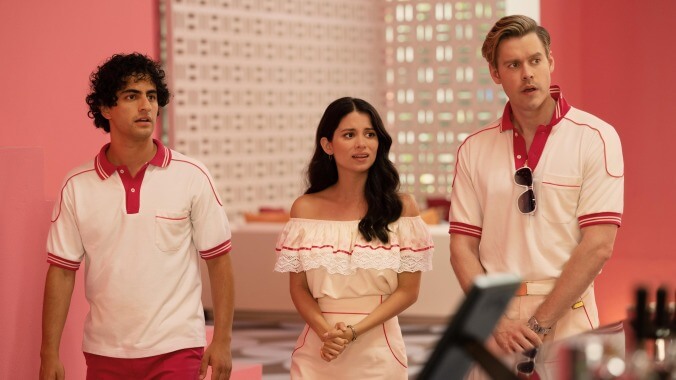Apple TV Plus delivers another winning comedy with Acapulco
Good-natured comedy and uniformly appealing performances sell this coming-of-age story

Apple TV+’s Acapulco perches at the intersection of nostalgia and escapism, two of the driving forces behind some of the most prominent TV shows in recent years. The comedy, from Eduardo Cisneros, Jason Shuman, and Austin Winsberg, takes place in the 1980s, a time period that’s been revisited at length on the big and small screens. The Mexican city of Acapulco provides a gorgeous, seaside backdrop and more than a touch of old Hollywood glamor.
But like the plucky dreamer at its center, Acapulco has a strong desire to be something more. The series is nostalgic for a setting that’s never really been seen on U.S. television, hearkening back to a time when Acapulco was still a thriving resort city—long before being competing with other tourism hot spots like Cabo San Lucas and Cancún, or getting pulled into the Mexican Drug War. And while tourists and white Americans are featured throughout, they’re not the focus of the story. This winsome new comedy is more concerned with the mostly Mexican employees of the fictional Las Colinas resort, many of whom grew up near it and have been irresistibly drawn to it since childhood.
It’s a very specific milieu, one that Acapulco works to make accessible, though not by wasting time with a bland (often white) entry point character, the kind who grows to understand and appreciate an “exotic” locale. Instead, our guide is Máximo Gallardo, who’s played in the present by Eugenio Derbez, stepping back into his How To Be A Latin Lover role. Now worth millions (and his gigolo past seemingly retconned), Máximo regales his 14-year-old nephew Hugo (Raphael Alejandro, also reprising his character) with his life story.
One of the most pivotal chapters in that life took place at Las Colinas, where he worked as a pool attendant and honed the skills that would one day make him the owner of more than 60 lucrative companies. But in 1984, young Máximo (Enrique Arrizon) is just an earnest young man trying to take care of his family by scoring a job with the biggest employer in town. His mother Nora (Vanessa Bauche) has warned him away from Las Colinas for years, offended to her very Catholic core by what she deems the sin and excess of the resort. All Máximo sees is opportunity—for financial security, adventure, and maybe even romance.
His is a familiar coming-of-age story, that of trying to do the right thing even when you’re not entirely certain what it is. Acapulco is packed with such recognizable elements: the head-in-the-clouds protagonist who’s pestered by a precocious sibling (Regina Reynoso as Sara, a wannabe socialist), pines for a beautiful young woman (Camila Perez as Julia), and has an unshakeable bond with his best friend (Fernando Carsa’s Memo). But the series manages to make its story feel new, thanks to engaging characters and a distinctly Mexican setting. Acapulco’s seen more than its share of visitors, but it’s never been seen quite like this—vibrant yet in flux, waning and rallying at the same time.
Despite a clear aim to reach as broad a viewership as possible, Acapulco sacrifices none of its cultural specificity to do so. The cast is full of Mexican TV stars, including Derbez, Bauche, and Alcázar. There’s as much dialogue in English as in Spanish, with a very telling line of division—workers like Máximo, Memo, and Hector (Rafael Cebrián) can only speak in the former around guests, but mostly chat in the latter when they’re by themselves. When Máximo playfully chides his pocho nephew for not speaking Spanish, it’s not hard to understand his concern that Hugo isn’t connected to his culture (although, obviously, Mexican culture consists of much more than being fluent in Spanish). Those are among the many details that make Acapulco’s depiction of its namesake both authentic and inviting.
This undeniably good-natured series isn’t afraid to seek out conflict, though. Máximo’s naïvete erodes the longer he’s at Las Colinas, for good and ill. For Don Pablo (Damián Alcázar), his role model, success has come at a high price. Julia, an aspiring fashion designer, begins to see her boyfriend Chad (a blithe Chord Overstreet) in a new light. We learn the basis for Nora’s fears that the resort will corrupt her son.
As with fellow Apple TV+ comedy Ted Lasso, Acapulco allows these tensions to rise naturally—never forcing a happy resolution, but also not belaboring the friction. It’s a well-balanced show with an endearing lead performance and a whole roster of equally charming supporting players, all of whom get standout moments or spotlight episodes. A sense of generosity runs through all of the series’ storylines, even when they center on boorish characters like Chad or his aerobics impresario mom Diane (Jessica Collins).
Obtrusive narration can quickly sap the fun out of even the most winning story, but Derbez is an incredibly charismatic storyteller. Most of the series takes place in the past, with young Máximo figuring out what he wants out of life. When present-day Máximo realizes that this chapter is far from closed, though, it gives the comedy an intriguing late-hour boost. It’s not exactly a cliffhanger, though there’s definitely more story to be told. Acapulco isn’t the breakout comedy that Apple TV+ found with Ted Lasso, but with a little luck, Máximo’s young nephew won’t be the only rapt audience the show finds.